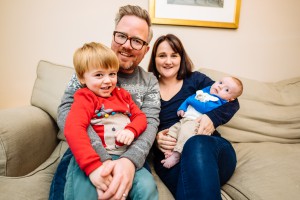 Solihull couple, Amy and Daren Reynolds have even more reason to celebrate as they mark their first-born son’s third birthday this month. After enduring the heartbreak of three unexplained miscarriages, including twins, 31-year old Amy and 35-year old Daren feared they would never have a baby of their own, never mind two.
Solihull couple, Amy and Daren Reynolds have even more reason to celebrate as they mark their first-born son’s third birthday this month. After enduring the heartbreak of three unexplained miscarriages, including twins, 31-year old Amy and 35-year old Daren feared they would never have a baby of their own, never mind two.
After her first miscarriage in 2010 and then the sad loss of the twins, both before the 12 week stage of pregnancy, Amy decided that she would try five times in total. But thanks to pioneering work at Heartlands Hospital, Amy and Daren are at last proud parents to Freddie, who turned three on 22 January 2016 and Henry, aged four months.
Amy said: “I saw it as losing four lives rather than as three devastating events. It was almost a sense of relief to know that I could get help after the third miscarriage.”
Referred by her GP to Heartlands Recurrent Miscarriage Clinic when she fell pregnant for the fourth time, Amy took part in a double blind trial called PROMISE, where half the participants received supplements of the hormone progesterone for 12 weeks, and the other half received a placebo to see if the hormone boost helped to maintain a healthy pregnancy. Although she was not aware if she had received the progesterone or the placebo, Amy gave birth to Freddie, who was a healthy eight pounds. The couple then went on to have Henry on 13 September 2015 weighing nine pounds after participating in the RESPONSE trial, introduced to test a new medication called NT100.
Women taking part in the RESPONSE trial made up to 12 clinic visits during their pregnancies, with half the participants receiving the NT100 medicine and half receiving a placebo. NT100 is a man-made form of a naturally occurring protein in the female reproductive tract called G-CSF (granulocyte colony-stimulating factor) and the aim of the trial was to find out if this drug improves the chances of maintaining a successful pregnancy.
Amy said: “The boys are my two little miracles – I’m so blessed to have them. The fact I was helping myself by taking part in the trials helped raise my morale. I can’t thank recurrent miscarriage midwife, Rachel Small and obstetrics & gynaecology consultant, Dr Gupta enough. They took care of me and monitored the babies but more importantly, they understood why I was worried. I also hope by sharing our story, we might help other people reach out for much-needed support.”
Rachel Small said: “Miscarriage can be devastating, lonely and a heart-breaking time for couples. The Recurrent Miscarriage Clinic looks to find causes and treatments for preventing miscarriage, as well as offering support and continuity of care. In some couples we do not find a cause for their miscarriages hence why it is so important we continue our clinical trials, to try to find new causes and treatments for women like Amy so couples can take their babies home. I am so happy for Amy and Daren that they have their happy ending twice and also very grateful to them for participating in our clinical trials that will benefit many couples in the future.”
Having recently celebrated Freddie’s third birthday and in the process of arranging a baptism for Henry in May, Amy is content with two healthy boys. She says, “I’m not going to push my luck, I have my two miracles.”
For further information about the Recurrent Miscarriage Clinic at Heartlands Hospital, including the criteria for referral to the clinic and any clinical trials taking place, call: 0121 424 3505.
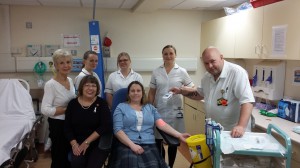 Breast Friends Sutton Coldfield has given a huge boost to cancer patients at Good Hope Hospital by donating an Accuvein machine, which helps to cannulate patients prior to treatment.
Breast Friends Sutton Coldfield has given a huge boost to cancer patients at Good Hope Hospital by donating an Accuvein machine, which helps to cannulate patients prior to treatment.
Cannulation is where a small needle and tube is placed inside a vein to provide venous access, allowing staff to take blood and administer medication. The £4,000 Accuvein machine helps identify delicate blood vessels in the arm and wrist, reducing the need to cannulate more than once and reducing pain and stress for patients. This is especially important for those being treated for cancer, who might need several cannulations over the course of their treatment.
Breast Friends Sutton Coldfield is a charity that’s celebrating its 20th birthday this year. It’s run by volunteers who have all been diagnosed with breast cancer and they help local women by offering emotional and practical support and raising awareness of breast cancer in the community. They raised the money from donations, collections, coffee mornings, marathons and support from local businesses.
Jacqueline Benzecry, Chairman of Breast Friends Sutton Coldfield, presented the machines to members of the Radiology team, who were delighted with the new addition.
Jacqueline said: “This year is a very special one as it is our 20th anniversary. For this reason we wanted to focus our fundraising efforts on medical equipment that can make patients’ stay a better experience as well as direct support for breast cancer patients.
“Thanks to the great contributions we received from local community and local businesses, we were able to buy two Accuvein machines, one for Oncology last July and now this one for Radiology.”
Philippa Willis, site lead radiographer, said: “The light projected by the device allows us to see delicate blood vessels straight away, without the need to cannulate more than once. This means reducing time for cannulation and reducing pain and stress for patients. It’s portable too, which allows us to use it all throughout the department.”
Breast Friends have more fundraising activities planned for the year, including a Fashion Show on 6 June and the Big Pink Ball on 7 October, both being held at Moor Hall Hotel. They’re also looking for supporters to take part in the Great Midlands Fun Run on 5 June.
For more information about Breast Friends, email enquiries@breastfriends.org.uk or call Jackie on 0121 378 3037.
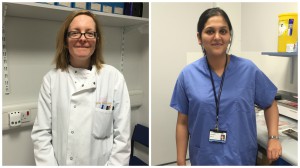 Heartlands Hospital’s advanced biomedical scientists, Julie Watson and Charanjit Sihota, are enabling faster treatment for breast cancer patients by helping to prepare breast wide local excision specimens (tissue removed during a lumpectomy).
Heartlands Hospital’s advanced biomedical scientists, Julie Watson and Charanjit Sihota, are enabling faster treatment for breast cancer patients by helping to prepare breast wide local excision specimens (tissue removed during a lumpectomy).
These specimens have traditionally only been prepared and trimmed by consultant histopathologists, but Julie and Charanjit have received specialist training so they can assist in staging tumours more accurately and quickly. The results are discussed at the breast cancer multi-disciplinary team meeting where decisions are made on how treatment should proceed.
Their training programme commenced in December 2015 and involves educational sessions, one-to-one time observing and being supervised on a daily basis by Dr Neha Dalal, consultant histopathologist at Heartlands Hospital. Julie and Charanjit, part of the histopathology team, have continued with their daily laboratory duties while learning this new skill. Their training is nearly finished and they are due to commence independent work from next month.
Dr Dalal said: “Julie and Charanjit’s decision to further their education and develop their skills has meant that important pathology specimens can be processed more quickly for patients. Needless to say, their commitment, enthusiasm and determination is commendable. Ultimately, this training programme will speed up the specimen pathway and therefore help improve patient care.”
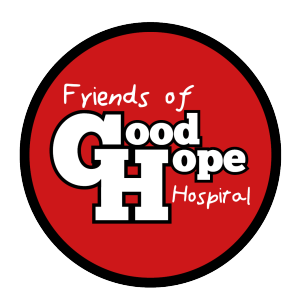 The Friends of Good Hope Hospital fundraising group is putting on a country and western night at Sutton Coldfield Rugby Club on Saturday 25 June to raise money for Good Hope Hospital.
The Friends of Good Hope Hospital fundraising group is putting on a country and western night at Sutton Coldfield Rugby Club on Saturday 25 June to raise money for Good Hope Hospital.
Music will be provided by the Anker Valley Boys with a square dance. There will also be a hog roast with trimmings, and a raffle with some great prizes, donated by local businesses, including hair appointments, malt whisky, Ray Ban sunglasses and £100 John Lewis vouchers. Tickets cost £35 per person or £350 for a table of 10. To find out more or buy a ticket, please contact Tony Cannon on info@friendsofgoodhope.org or 07444 537656.
Friends of Good Hope Hospital formed in November 2015 and they hope to raise £15,000 this year. They have already raised £1,700 from bucket collections, tombolas and coffee mornings and hope to sell 180 tickets for their country and western night, getting them another step closer to their ambitious target.
The money raised will be used to provide those little extras that make such a difference for patients, and this week they presented a record player to the elderly ward so they can play their collection of records.
Tony Cannon, joint chair of the group, said: “We are really excited about this fun event. We hope that as many of you as possible will dig out your cowboy boots and ‘mosey’ on down to help us raise as much money as we can to support the staff and improve the patient experience at Good Hope Hospital.”
The group is also looking for more fundraising volunteers, so if you have some time to spare and would like to get involved or to donate, contact them on:
- www.friendsofgoodhope.org
- 07444 537656
- info@friendsofgoodhope.org
- Facebook – foghh
- Twitter @infoFogh
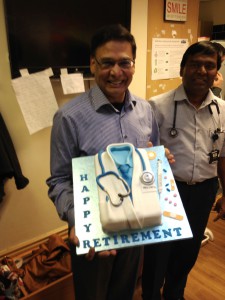 A new granddad who has worked in the NHS for over 40 years as an emergency doctor has been given a fond farewell by his colleagues as he hangs up his stethoscope for the final time.
A new granddad who has worked in the NHS for over 40 years as an emergency doctor has been given a fond farewell by his colleagues as he hangs up his stethoscope for the final time.
Dr Kishore Gupta, originally from India, began working in the NHS back in 1974 and after a spell working at Heartlands Hospital, has spent the last 20 years working as a consultant in the Emergency Department at Good Hope Hospital, part of Heart of England NHS Foundation Trust.
The popular father-of-two, who recently became a granddad, was given a rousing send-off by his colleagues who presented him with gifts including a spectacular doctor cake to mark his retirement.
Dr Gupta, 69, from Edgbaston, was joined by his wife Madhu to say his goodbyes and he said he would miss the close-knit team at Good Hope.
He said: “I have had a great time here and made many, many friends. Despite the often intense pressure of the job I have always enjoyed coming to work and always felt the support of my team.
“I’ve have been a consultant on the frontline in the emergency department and have enjoyed the fast pace and having to make quick decisions to help people. After 40 years in the NHS it will take a bit of time to get used to not being there. But I’m a granddad now and my wife has got us going on a cruise so I’m sure I will be kept busy.”
Dr Ola Erinfolami, clinical director of emergency medicine at Heart of England NHS Foundation Trust, was on hand at the farewell to say a few words in tribute to his retiring colleague.
He said: “Kishore has been an extremely respected and much-loved colleague for many years and will be sorely missed within the department and particularly within his team in Minors. I would like to wish him all the best in the future and hope he enjoys a well-deserved and enjoyable retirement.”
Following the success of an innovative rehabilitation programme for patients with lung diseases at Solihull Hospital, many who have benefited from these sessions will be returning to act as ‘buddies’ to help new patients.
Pulmonary rehabilitation is a combination of exercise and education for people with long-term lung conditions, provided by Heart of England NHS Foundation Trust, which runs Solihull Hospital. Physical exercise sessions are provided alongside with discussion and advice on lung health – all designed to help people manage the symptoms of their condition. Rehab lasts eight weeks, with two sessions twice a week at venues in and around Solihull helping patients to improve their general fitness, cope better with feeling out of breath, feel stronger and fitter and able to do more.
Former rehab patient Leila Meechan, who is now a volunteer ‘buddy’ for the programme, said: “Because of the excellent treatment we have had, we want to give something back. We will be working alongside the pulmonary rehabilitation team and acting as ‘buddies’ to new patients joining the programme.”
Helen Beadle, specialist physiotherapist, said “Our new volunteers will offer a unique perspective to patients supporting them through the programme, helping to maintain morale as they have been through the pulmonary rehabilitation classes themselves and can offer that first- hand experience.”
If you have already completed the programme and would like to consider volunteering, please contact the pulmonary rehabilitation team at Solihull Hospital on 0121 424 5446.
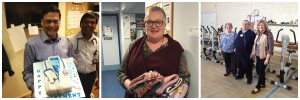 A member of staff at Heart of England NHS Foundation Trust and volunteers from the Lingard House ‘knit and natter’ group in Walmley are putting their craft skills to the test by making twiddle muffs for patients with dementia. And they are looking for donations of wool, buttons and ribbons to help them.
A member of staff at Heart of England NHS Foundation Trust and volunteers from the Lingard House ‘knit and natter’ group in Walmley are putting their craft skills to the test by making twiddle muffs for patients with dementia. And they are looking for donations of wool, buttons and ribbons to help them.
Twiddle muffs are hand muffs decorated with ribbons, large buttons or textured fabrics that patients with dementia can twiddle in their hands whilst on the elderly wards at Heartlands, Solihull and Good Hope Hospitals. People with dementia often have restless hands and like something to keep them occupied. The twiddle muffs provide a source of visual, tactile and sensory stimulation at the same time as keeping hands snug and warm.
An avid crocheter, operations manager for women’s and children’s services at the Trust, Angela McKenna-Hylton got the idea from other Trusts who use the muffs – and has a target of making 100 twiddle muffs this year.
Irene Britton, a member of the knit and natter group at Lingard House in Walmley, which is run by the Sutton Coldfield Charitable Trust, contacted the Trust to see if there were any projects the group could get involved with, and is helping Angela meet her target. Irene said: “My sister made a twiddle muff for my brother-in-law and he enjoyed having it so I thought it would be a nice gesture for me and the ladies to help and give something back for the wonderful care he received at Heartlands Hospital.”
Angela said: “We are hoping that people will generously donate their spare bits of wool, buttons, and ribbons so they can be put to good use and make more twiddle muffs. They are an excellent way of helping to combat the restlessness and agitation that may be experienced by patients with dementia. This project is part of a wide range of work we are doing to support our patients with dementia and we would love to have your help.”
Please send any haberdashery you would like to donate to: Angela McKenna-Hylton in children’s outpatients at Heartlands Hospital.
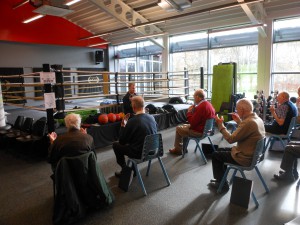 A partnership between Solihull Hospital and a leisure centre in the town is set to prove beneficial to patients with neurological conditions as well as reducing pressures on the hospital.
A partnership between Solihull Hospital and a leisure centre in the town is set to prove beneficial to patients with neurological conditions as well as reducing pressures on the hospital.
Solihull Hospital, part of Heart of England NHS Foundation Trust, has teamed up with Solihull Council to put on therapy classes for patients with conditions such as Parkinson’s Disease and Multiple Sclerosis at the popular Tudor Grange Leisure Centre in Blossomfield Road.
The collaboration will give patients access to a better social environment and facilities at Tudor Grange, whilst also helping to reduce waiting lists at the hospital.
Marie Adams, senior neurology physiotherapist at Solihull Hospital, said: “We are delighted to be working with the team at Tudor Grange Leisure Centre and grateful that they are hosting these classes which will produce numerous benefits for our patients.
“The exercises in the classes were developed collaboratively between the teams at Solihull Hospital, Solihull Council and Tudor Grange but also with the patients to ensure they are tailored to their needs.
“For the first couple of weeks during the transition we conducted the classes while the exercise facilitators from Tudor Grange observed but now they have taken over and it is proving to be a great success and we have received plenty of positive feedback. I am very proud of my team’s continued hard work and shared vision to ensure sustainable services for neurological long term conditions for the future.”
Councillor Ken Meeson, Cabinet Member for Health and Wellbeing at Solihull Council, said: “The neurology team at Solihull Hospital enlisted our help to develop a community-based alternative for their MS and Parkinson’s specific exercise classes. With a history of successfully delivering specialist exercise classes for respiratory patients as a follow on from hospital pulmonary rehab, the transition of MS and Parkinson’s classes into Tudor Grange Leisure Centre was deemed to be the best option.
“The Council’s Solihull Active team worked closely with our service delivery partner Parkwood Community Leisure and the neurology therapy team, to ensure the right exercise service for supporting people with MS and Parkinson’s disease. These classes have been a huge success and provide a fantastic opportunity for local people to benefit from being regularly active.”
Heartlands Hospital scientists help speed up breast cancer treatment
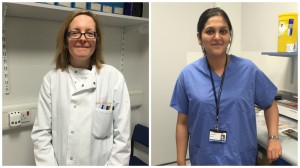 Heartlands Hospital’s advanced biomedical scientists, Julie Watson and Charanjit Sihota, are enabling faster treatment for breast cancer patients by helping to prepare breast wide local excision specimens (tissue removed during a lumpectomy).
Heartlands Hospital’s advanced biomedical scientists, Julie Watson and Charanjit Sihota, are enabling faster treatment for breast cancer patients by helping to prepare breast wide local excision specimens (tissue removed during a lumpectomy).
These specimens have traditionally only been prepared and trimmed by consultant histopathologists, but Julie and Charanjit have received specialist training so they can assist in staging tumours more accurately and quickly. The results are discussed at the breast cancer multi-disciplinary team meeting where decisions are made on how treatment should proceed.
Their training programme commenced in December 2015 and involves educational sessions, one-to-one time observing and being supervised on a daily basis by Dr Neha Dalal, consultant histopathologist at Heartlands Hospital. Julie and Charanjit, part of the histopathology team, have continued with their daily laboratory duties while learning this new skill. Their training is nearly finished and they are due to commence independent work from next month.
Dr Dalal said: “Julie and Charanjit’s decision to further their education and develop their skills has meant that important pathology specimens can be processed more quickly for patients. Needless to say, their commitment, enthusiasm and determination is commendable. Ultimately, this training programme will speed up the specimen pathway and therefore help improve patient care.”
You may be eligible to participate in a clinical study evaluating non-invasive ultrasound technology to treat resistant hypertension (high blood pressure)
To be eligible
*Your systolic blood pressure must be 160mmHg or more.
*You must be being receiving at least 3 different blood pressure medications, one of which is a diuretic.
There are other inclusions/exclusions.
There is no charge to participate in the study.
If you are interested and would like more information, please contact:
Christine Laukam on 0121 4242158 or christine.laukam@heartofengland.nhs.uk






